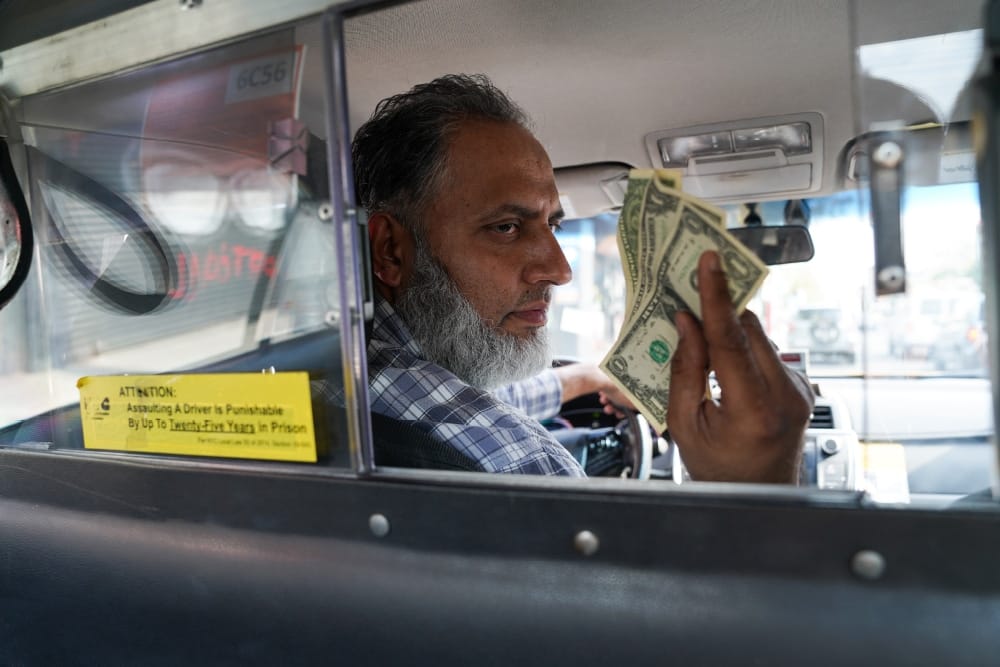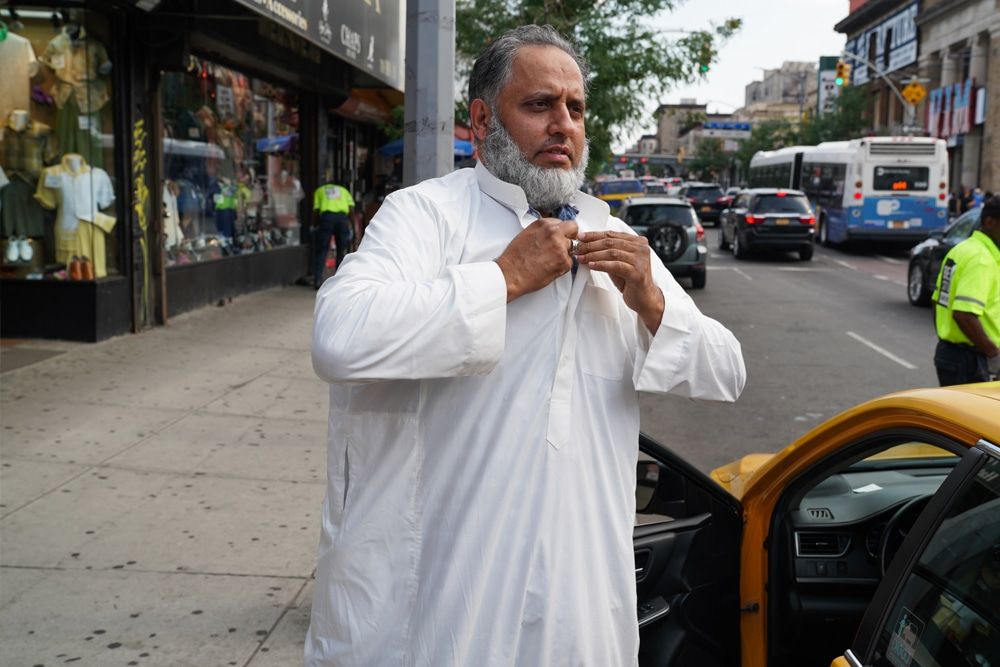Life Of A Cabbie In The Age Of Coronavirus: The Bills Keep Coming


MIDWOOD/KENSINGTON – Being a cab driver in NYC was never easy. It takes a certain kind of grit to sit in one place for 12 hours a time, seven days a week. Now multiply that by four, because there are four weeks in a month. And multiply that by 12, because there are 12 months in a year. And multiply that by 30. Because Hassan Iqbal has been doing it for 30 years. Being a cab driver was always difficult. But it has gotten even harder in this new reality of the coronavirus.
Iqbal (who, in full disclosure, is my dad) is a man with a gray beard, which is lighter in some parts and darker in others. He lives in Brooklyn with his family and has lived in this borough for the most part of his life. When he smiles or when he laughs, his big cheeks come into view. His kids tease him and tell him he resembles a chipmunk when that happens. He has a beauty mark above his lip. His hands are strong but very gentle. And he has bags under his eyes; bags, that when you look deeply, tell the story of hard work, sacrifice, and love.
The 52-year-old man was born and raised in Lahore, Pakistan. When he was younger, he wanted to be a doctor or an engineer. But then he decided to come to America for a better life when he was 23 years old. It was the American Dream, he said. He soon realized that it was not going to be easy. And it wasn’t. Throughout his years as a cabbie, he has been spat on, called names, punched in the face. A lot of it was fueled by anti-Muslim hate after 9/11.
“A lot of people yelled at me,” he said. “They screamed when they looked at my name and my face. ‘Oh, it’s a Muslim guy.’ They spit at me,” he told me. “There are bad people everywhere, in every country and every religion, you know?”
But people were also kind. After 9/11 he picked up a man from Colorado, who was going down to a bakery in the East Village. In the cab, the man saw that he was Muslim and they talked about what Muslims were going through. The man bought a couple of cakes and gave Iqbal a small cake box and said: “Don’t open it until you get home.” When he got home and opened it, the cake had a message on it, written in icing.
‘Thanks, Hassan for coming to America. We appreciate it. Thank you very much.’
“My tears came out,” Iqbal said. “I always say, there are very good people in New York.”
Soon enough, came the rise of Uber and Lyft and other ride-hailing companies. Iqbal kept a positive mindset and believed that people would prefer taking a yellow cab over a black Uber, for example, because a yellow cab is an NYC treasure. But he was wrong. The competition devastated the yellow cab industry.
“In 2012, when taxi cabs ruled the streets, the daily ridership was nearly 500,000 trips per day. Each subsequent year, the ridership number fell further, while the number of foreclosed taxi medallions rose,” the NY Daily News reported. “Fast forward to 2019, and cabbies count about 230,000 rides a day — less than half of what they sold just seven years ago.”
The number is expected to decrease even more this year. Cab drivers make money from people who take the cab. If the coronavirus is causing people to stay at home and quarantine to help reduce the spread, then who are the cab drivers picking up? How do they make their money? And, as Iqbal asked, “How do we pay our bills?”
Yesterday, like every other day, Iqbal worked from 5 a.m. to 5 p.m. During that time, he made $200. That would be fine if all that money was for himself. But, $75 went toward his lease, $15 went to paying for gas, $45 for congestion pricing surcharge, and $7 for food. He was left with just $58 to bring home.
“There’s no work. Nobody is outside because of the coronavirus,” he said. “The only people who are outside are those going to the doctor or doing the grocery.”
Iqbal will spend hours driving around before he finds a passenger. He said he has been driving around hospitals hoping people will come out and hail a cab. “The city is empty,” he said.

People are stocking up on groceries and are limiting going outside as much as possible. Stocking up on groceries cost money. And so does paying the rent. A lot of the worrying is done by his wife for 25 years, Sajida Iqbal. She said she worries he might get the coronavirus.
“I am very scared. There are so many different types of people that sit in his car. What if they are sick?” she said. “But I know he’s not afraid of getting sick. He always says he will do anything for his kids. He did it all for you. Remember when his mother came here? She told him, ‘You’ve been here for 30 years. What have you done? You’ve done nothing.’ He pointed at you all. He said he did it for you. Making halal money, spending halal money, all for us. I know he won’t stop.”
And she’s right, he won’t. In fact, none of the yellow cab drivers will. Uber and Lyft drivers won’t either.
Just yesterday, Mayor Bill de Blasio announced that he was signing an executive order banning all carpool trips and restricting ride-hail trips to one customer per ride. Families can ride together, and so can couples, but it has to be “real couples.” One effect of the coronavirus? Social distancing. Uber has also expanded its sick pay policy for drivers; it will no longer require drivers to have a positive COVID-19 test in order to qualify for sick pay. This comes after pressure from the Independent Drivers Guild.
“Uber has done the right thing by expanding its sick pay policy. Drivers with symptoms or who are at high risk for infection are much more likely to stay at home when they can receive sick pay — and that is how we stop the spread of COVID-19,” Brendan Sexton, Executive Director of the Independent Drivers Guild said. “With our free telemedicine benefit for New York drivers, qualifying for Uber’s sick pay is now as easy as a quick phone or video chat with a doctor. We urge all drivers experiencing symptoms or concerned about their risks to take advantage of this important resource and stay home.”
“We are urging all ride-hail apps and gig economy companies to act quickly to follow Uber’s lead and expand sick leave for drivers,” Sexton said. The lives of drivers, riders and members of our communities depend on app companies taking responsible action right now, today, and communicating these policies to the drivers.”
Those who drive yellow cabs are not fortunate enough to have any sort of sick leave.
Many of them, though, are paying mortgages if they own their medallion. For them, the largest holder of taxi medallion loans, Marblegate Asset Management, announced a “30-day payment holiday for individual drivers who own their medallion,” Crain’s New York Business reported. “The firm will push back the payments for a month to ‘help owner-drivers manage their medallion loans… and keep their cars on the road during this challenging period.'”
But, what do these cabbies do once the city is in total shutdown and there’s a shelter-in-place?
“The bills aren’t going to stop coming. We will still have to pay rent. I don’t know how I am going to do it. Cab drivers need help and the city has to do something,” he said. “We all worked really hard in this city, for this city. So why can’t anyone help us? I am very worried. But I leave it to Allah.”




